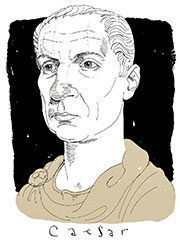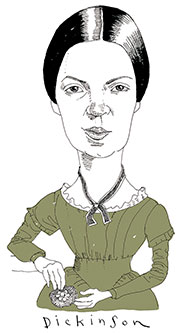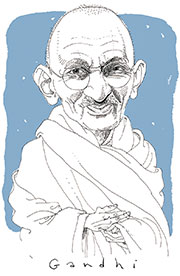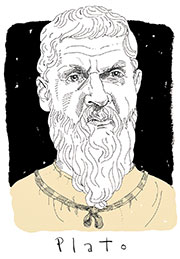“The humanities remind us where we have been and help us envision where we are going. Emphasizing critical perspective and imaginative response, the humanities—including the study of languages, literature, history, film, civics, philosophy, religion, and the arts—foster creativity, appreciation of our commonalities and our differences, and knowledge of all kinds.”
—from The Heart of the Matter, a 2013 report by the American Academy of Arts and Sciences
Isabelle Ibibo ’16 wants a career in medicine. Although she’s been taking the science and math courses she needs to apply to medical school, when the time came to choose an undergraduate major, Ibibo decided to go with her heart and declare Spanish.
 “I always enjoy my Spanish classes the most,” says Ibibo (Green Bay, Wis.), sounding like thousands of Carls before her who have discovered that their passion lies within the humanities. But her decision takes on extra significance in the midst of a national debate about the value of the humanities in today’s challenging economy.
“I always enjoy my Spanish classes the most,” says Ibibo (Green Bay, Wis.), sounding like thousands of Carls before her who have discovered that their passion lies within the humanities. But her decision takes on extra significance in the midst of a national debate about the value of the humanities in today’s challenging economy.
A June 2013 article in the Wall Street Journal painted a picture of precipitous decline in the humanities, citing only 7 percent of U.S. college graduates who majored in the humanities in 2010 (as compared to 14 percent in 1966). “The relative decline of majors in subject areas like English is modest when accounting for the increased propensity of Americans to go to college,” wrote New York Times columnist Nate Silver in a rebuttal article.
While the number of students who are earning bachelor’s degrees increased by 60 percent from 1971 to 2011, the percentage of humanities degrees in the general populace remained fairly steady. Although college attendance has grown, many degree-seekers have eschewed the humanities in favor of preprofessional and applied programs that weren’t offered as widely 30 years ago. Legislators argue that these more practical programs are the best choice in a tough economy, backing up their opinions with drastic cuts to humanities funding at both the national and state levels.
“Funding is a real problem,” says Susannah Ottaway ’89, the Marian Adams Bryn-Jones Distinguished Teaching Professor of the Humanities and current director of Carleton’s Humanities Center. In 2012 the National Endowment for the Humanities (NEH) was able to fund only 14.7 percent of the competitive grant applications it received, the lowest funding rate in its 45-year history.
The Heart of the Matter
A bipartisan team of four legislators—two from the Senate and two from the House—recently commissioned a report from the American Academy of Arts and Sciences on the state of the humanities in the United States. Issued in 2013, The Heart of the Matter outlines a plan to help the country reassert its excellence in the humanities. Now it’s up to Congress to decide which—if any—of these recommendations it will implement.
1. Educate Americans in the knowledge, skills, and understanding they will need to thrive in the 21st century.
• Support literacy programs. The nation depends on a fully literate populace whose reading, writing, speaking, and analytical skills improve over a lifetime.
• Invest in the preparation of citizens. Voters, informed consumers, and productive workers need a thorough grounding in history, civics, and social studies.
• Increase access to online resources to ensure that quality educational materials are available to all students, especially the disadvantaged.
• Engage the public through a strong network of schools, museums, and cultural institutions.
2. Foster a society that is innovative, competitive, and strong.
• Invest in research and discovery. Philanthropists and state and federal governments should increase funding to humanities programs at all levels.
• Communicate the importance of research to the public. When scholars share their research with a wider audience, everyone benefits.
• Create cohesive curricula to ensure all students gain basic competencies.
• Support teachers. Create a Humanities Master Teacher Corps to complement the STEM (science, technology, engineering, and mathematics) Master Teacher Corps.
• Involve humanists in solving the challenges that face our world, such as how to provide clean air and water, food, education, energy, and access to health care to everyone on the planet.
3. Equip the nation for leadership in an interconnected world.
• Establish and expand foreign language programs in school districts, colleges, and universities.
• Expand federal funding for education in international affairs and transnational studies.
• Increase federal funding for study abroad and international exchange programs, including the Fulbright Program and others.
• Encourage cities, states, libraries, and museums to develop programs to transmit humanistic expertise from one generation to the next.
“Federal funding to the NEH has dropped 40 percent since 1994,” says history professor Serena Zabin. In response to budget cuts, Zabin and Ottaway traveled to Washington last May to lobby on behalf of increasing humanities funding. They weren’t alone: in June the American Academy of Arts and Sciences released a report titled The Heart of the Matter calling on Congress to reinvest in the humanities and social sciences for the sake of American education, security, and competitiveness (see sidebar on right).
The debate on declining funding and enrollment figures centers on the prospects of college graduates who are entering a hostile job market. Forbes’s list of the 15 most lucrative majors, based on earnings, is composed almost entirely of science, technology, engineering, and mathematics (STEM) fields. However, the Association of American Colleges and Universities (AACU) released a report in January arguing that the workplace needs more than just the skills that come from a STEM or preprofessional major. More than 90 percent of employers surveyed by the AACU agreed that candidates’ demonstrated capacity to think critically, communicate clearly, and solve complex problems is more important than the subject matter of their undergraduate major.
Although humanities majors start out near the bottom of college graduates in terms of salary, AACU’s data show that earnings increase robustly over time and, by midcareer, humanities majors outperform peers who were in preprofessional fields in college. David Rubenstein, cofounder and CEO of the Carlyle Group, a billion-dollar private equity firm, argued in a January 2014 New York Times piece that the reasoning skills that come with a humanities education result in higher-paying jobs over time. “H=MC. Humanities equals more cash,” Rubenstein said.
Ottaway takes a historian’s approach to the challenges of funding and skeptical public discourse. “There has always been tension between the practical, apprenticeship side and the purely academic side of education,” she says. “Despite all this cyclical concern about practicality, the value of the humanities hasn’t changed. As Harvard’s president Drew Faust recently wrote, ‘Why study the humanities? Interpretation, judgment, and discernment will always be in demand, and they are cultivated and refined in the humanities.’ ”
Ottaway shies away from a defensive stance when it comes to confronting negative perceptions about the humanities. “We should be celebrating what we do,” she says. “We haven’t been accustomed to talking about the value of our work because it seems self-evident to us. But we need to remind people of why the humanities are important to them.”
Humanities programs around the country have become more intentional about promoting the benefits they offer to students in the short and long term, including advising current majors on how to showcase the skills they’re learning on graduate school applications, on résumés, and in job interviews.
“The economic downturn has forced us to address these topics more explicitly,” says Louis Newman, Carleton’s director of advising and the John M. and Elizabeth W. Musser Professor of Religious Studies. “The humanities help prepare students for thinking and writing clearly, working in groups, and relating to people with backgrounds and experiences different from theirs. We’re preparing our students to be successful in a wide variety of careers and to reflect deeply on the human experience.”
A January Chronicle of Higher Education article notes that the success of humanities majors in the workforce lies in their ability to transition between career fields and to earn graduate degrees, including in fields outside their undergraduate major. Career success is “more a marathon than a sprint,” says Debra Humphreys, coauthor of the AACU’s report on humanities graduates’ earnings. Humanities education gives students a robust foundation for a graduate degree, which in turn corresponds to a median annual earnings rise of $19,550.
“Medical schools are receptive to humanities majors, because the scientist doesn’t always make the best doctor,” says Brett Cucchiara ’92, a physician at the University of Pennsylvania Medical Center. “The practice of medicine is as much about effective communication as it is about science.” Cucchiara believes that his English major provided him with the analytical tools and empathy he needs to relate to patients and to distill the information they share with him in order to get at the heart of their problems and concerns.
In a different arena, Hudson Kingston ’05 says that his majors in English and French were the right preparation for his professional journey, which includes a law degree, two master’s degrees in international law, and a career as a public interest attorney in Washington, D.C. “Some of the most important skills for a lawyer are reading, writing, and speaking clearly and confidently,” says Kingston. “At my last job, I was working on environmental law with regard to genetically modified foods. I’m not a biologist, but I was able to soak up information and speak intelligently about products on the market and the methods used to create them. Now I’m working on matters concerning online privacy and consumer protection. There are few similarities between computers and genetically modified crops. There’s no degree that could have prepared me explicitly for this job, but studying English and French taught me how to speak and write competently on almost any topic.”
Glowing reviews notwithstanding, humanities programs are tougher to sell today to prospective students and their parents. “Sometimes they’re looking for a direct outcome,” says Adam Webster ’00, an assistant dean of admissions at Carleton. “It’s my job to explain that the process and the journey also matter.”
 One of Carleton’s greatest strengths, Webster says, is its balanced excellence across academic disciplines, which offers students uniformly high-quality instruction as they explore the curriculum before declaring a major. Carleton depends on roughly equal numbers of majors across the disciplines to keep its liberal arts environment balanced and strong, but the number of humanities majors at the college has dropped from an average of 167 a year in the 1990s to an average of 137 in the first decade of the 21st century. Last year there were only 91 humanities majors.
One of Carleton’s greatest strengths, Webster says, is its balanced excellence across academic disciplines, which offers students uniformly high-quality instruction as they explore the curriculum before declaring a major. Carleton depends on roughly equal numbers of majors across the disciplines to keep its liberal arts environment balanced and strong, but the number of humanities majors at the college has dropped from an average of 167 a year in the 1990s to an average of 137 in the first decade of the 21st century. Last year there were only 91 humanities majors.
“We would like to be more effective recruiters of humanities students,” says Webster. “A balanced class requires students whose intellectual orientations stretch from the most abstract mathematics to the most theoretical humanities. Traditionally, it’s easier to identify the former, so we’re working hard to identify the skills and interests that show a prospective student is disposed toward the humanities.”
A Carleton history major himself, Webster whole-heartedly believes in the curriculum he’s promoting to prospective students: “We can say truthfully that our humanities students are well prepared for the rigors of an evolving workplace.”
Despite the stresses of funding and enrollment, the humanities are enjoying a renaissance of sorts as technology, collaboration, and public outreach revolutionize both teaching and scholarship. “This is an exciting time,” says Ottaway. “Technology is changing the way traditional scholarship happens, with projects that are more fluid and require collaboration across multiple disciplines.”
“The growth of technology means that rare primary sources that were once available only to visitors at the libraries where they’re held are now available digitally,” says Susan Jaret McKinstry, the Helen F. Lewis Professor of English and associate director for digital humanities at the Humanities Center. “The fact that we and our colleagues can have instant, simultaneous access to these materials changes the kinds of conversations we can have about them and the questions we can ask as humanists. We can now use in our teaching and research incredible amounts of detailed historical data that were prohibitively expensive and difficult to collect before.”
As scholars and students use technology to share their research more broadly with the public, to make resources available globally via the Internet, and to create analytical models and tools, they find themselves in new partnerships with computer scientists and other technological experts (see sidebar below).
 Technology may have been the catalyst for a greater emphasis on collaboration in the humanities, but the trend now reaches far beyond the digital realm. Janet Polasky ’73, the Presidential Professor of History at the University of New Hampshire, has discovered that collaborating with colleagues in other departments allows her to better serve the evolving needs of her students. This year she taught a course on revolutions with an Egyptian environmental political scientist. By combining their expertise, they were able to cover a broader range of topics than either could teach alone. “We must adapt to our students’ changing interests,” says Polasky. “Innovative teaching is at the heart of the humanities.”
Technology may have been the catalyst for a greater emphasis on collaboration in the humanities, but the trend now reaches far beyond the digital realm. Janet Polasky ’73, the Presidential Professor of History at the University of New Hampshire, has discovered that collaborating with colleagues in other departments allows her to better serve the evolving needs of her students. This year she taught a course on revolutions with an Egyptian environmental political scientist. By combining their expertise, they were able to cover a broader range of topics than either could teach alone. “We must adapt to our students’ changing interests,” says Polasky. “Innovative teaching is at the heart of the humanities.”
To that end, Carleton’s Humanities Center sponsors annual faculty research seminars, which give small groups of faculty research fellows the chance to work with peers to develop individual projects and discuss new ideas and perspectives that enrich both their teaching and their research. Participants report greater progress on their individual projects and also a positive effect on their teaching as they share their colleagues’ ideas and perspectives with their students.
The center also promotes partnerships outside the academy by supporting public humanities projects. For example, faculty and staff members and students participated this spring in the Minnesota Humanities Center’s initiative to document veterans’ voices by hosting an event on campus at which local veterans told their stories.
Ottaway and her colleagues are adamant that while the humanities are evolving, they will continue to be about more than jobs, money, or even serving society. “The truth is that the humanities are deeply important to everyone, whether we realize it or not,” says Ottaway. “Just ask someone, ‘What book changed your life? When was the first time you saw a movie or heard a song that allowed you to empathize with other people or gave you a new perspective on the world?’ There are transformative moments like that in everyone’s life—and we owe those moments to the humanities.”
Turning to Technology
Not only are humanities scholars changing the way they conduct research—they’re also changing how they share it. “We’re looking for ways to relocate ourselves outside the traditional, narrowly defined roles as receivers or deliverers of scholarly information,” says Katherine Rowe ’84, professor and chair of the English department at Bryn Mawr College. As a founding partner of Luminary Digital Media, Rowe seeks better ways to engage the public. Luminary’s iPad apps, designed in collaboration with the Folger Shakespeare Library, present classic plays such as Macbeth and Hamlet along with such extras as dramatic readings and historical annotations to make the work accessible to readers. “Using digital tools requires new collaborators,” says Rowe. “I’m exploring research and teaching opportunities that I cannot uncover by myself.”
 At Carleton, the Humanities Center plays a leading role in establishing partnerships among faculty members, staff members, and students. Each year the center funds several faculty-student research assistantships that are focused on digital projects, and in partnership with the library employs six students as interdisciplinary digital humanities associates. “It’s not a typical student job,” says Heather Tompkins, a reference librarian at Gould Library and the students’ supervisor. “They have a lot of autonomy, and they’re developing skills that they’ll use in the workplace after college. I’m impressed with their willingness to teach each other and to solve problems together.” This year the digital humanities associates have created a virtual tour of an epic poem, an online learning module for a Russian course, a database to map relationships between poets, and interactive maps for a history course.
At Carleton, the Humanities Center plays a leading role in establishing partnerships among faculty members, staff members, and students. Each year the center funds several faculty-student research assistantships that are focused on digital projects, and in partnership with the library employs six students as interdisciplinary digital humanities associates. “It’s not a typical student job,” says Heather Tompkins, a reference librarian at Gould Library and the students’ supervisor. “They have a lot of autonomy, and they’re developing skills that they’ll use in the workplace after college. I’m impressed with their willingness to teach each other and to solve problems together.” This year the digital humanities associates have created a virtual tour of an epic poem, an online learning module for a Russian course, a database to map relationships between poets, and interactive maps for a history course.
“The digital humanities are pushing all of us to the edges of what we’re comfortable with,” says Susan Jaret McKinstry, the Helen F. Lewis Professor of English and associate director for digital humanities at the Humanities Center. “Being able to add digital knowledge to these humanists is an extraordinary skill that will transfer to a whole range of fields in the workplace.”
Still more students will have an opportunity to work in the digital humanities over the next two years with the hire of a Robert A. Oden Jr. Postdoctoral Fellow for Innovation in the Humanities. This new instructor will teach courses in the digital humanities and help faculty members learn about technological tools to employ in their own classes and research. Says Jaret McKinstry: “This position will make our engagement with digital humanities a sustainable model over the long term.”

Comments
I just graduated with a degree in Art History, but am currently applying to medical school. I believe that I am just as prepared to enter a career in medicine with an art history degree as a peer with a degree in biology or chemistry. I think that studying the humanities in general, and art history in particular, is more about learning a particular way of thinking, as opposed to mastering a particular discipline. I know that the way I was taught to think critically about pieces of art work and critical literature will help me attack any problem or subject that I will encounter in my future career. Students shouldn't shy away from the humanities because they think they aren't practical; learning critical thinking and analysis is always pratical. I am extremely grateful for my Carleton liberal arts education and know that it will stand me in good steed for the rest of my educational and professional journey.